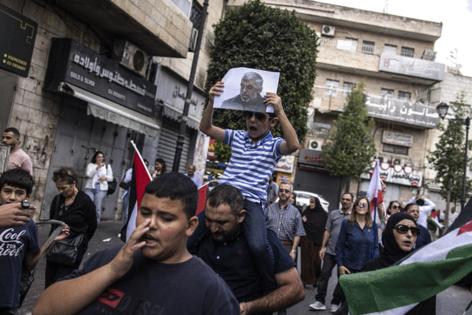US pushes for truce in Gaza after Israel kills Hamas leader
Published in News & Features
The U.S. ramped up its calls for a cease-fire in Gaza, saying Israel’s killing of the top Hamas leader had removed one of the main obstacles to peace.
Israel said it had eliminated Yahya Sinwar on Wednesday in the besieged Palestinian territory, just over a year after he ordered an attack on Israel that killed 1,200 people and his militants took about 250 hostage.
While killing Sinwar was one of Israel’s top aims in its invasion of Gaza, along with attempts to rescue the hostages, it remains unclear whether his death will mark the kind of turning point in the broadening Middle East conflict that U.S. officials described on Friday.
U.S. President Joe Biden said he’s sending Secretary of State Antony Blinken to Israel as part of efforts to end the conflict. “Now is the time to move on,” Biden told reporters after landing in Berlin. “Move on, move toward a cease-fire in Gaza.”
Sinwar’s death poses a new chance to seek a path to peace, Biden said in the German capital, where he’s arrived to discuss with European leaders Ukraine’s request for additional assistance.
Yet Israel is showing no appetite to stop fighting, with Prime Minister Benjamin Netanyahu saying “the mission before us is yet to be completed” despite Sinwar’s death. Hamas should no longer be able to govern in Gaza, he said, and about 100 hostages still need to be rescued. Dozens of those captured are believed to be still alive.
“Military operations need to end, and after this operation, a cease-fire must be accepted in Gaza,” French President Emmanuel Macron said. He offered implicit criticism of the US, the top supplier of weapons to Israel’s army.
“Those who deliver arms to lead operations on Gaza have particular responsibility because one can’t call for a cease-fire and continue delivering arms that allow these excesses,” he said.
Sinwar, who hadn’t been heard from in weeks, was slain in southern Gaza in what appeared to be a chance encounter. The killing marked a significant moment in a conflict that’s spread to Lebanon, where Israel has escalated an offensive against the militant group Hezbollah after a year of cross-border skirmishes.
Hamas confirmed the killing on Friday. The group’s Deputy Leader Khalil al-Hayya, one of the contenders thought to succeed Sinwar, confirmed his death in a televised speech, saying that it only provides more motivation to carry on the fight to “liberate our people” until a Palestinian state is established.
He said the hostages “will not return unless the aggression on Gaza stops,” Israel withdraws from the enclave and Palestinian prisoners in Israeli jails are released.
Sinwar’s demise leaves Hamas with no clear successor. With the world bracing for Israel’s expected retaliation against Iran for an Oct. 1 missile barrage, Netanyahu scored another coup after the assassination of Hamas political chief Ismail Haniyeh in July and Hezbollah’s leader Hassan Nasrallah last month.
One possibility to take over Hamas is Al-Hayya, who is based in the Qatari capital of Doha and has been leading indirect negotiations with Israel. Other Arab commentators suggested that Sinwar’s brother Mohammed, one of the top commanders of the Qassam Brigades, might be another candidate.
In the hours after Sinwar’s killing became public, Hezbollah said it was transitioning to a new phase of its confrontation with Israel. The group has been firing missiles into the north of the country since Israel started its campaign in Gaza. Both Hamas and Hezbollah are backed by Iran and designated terrorist groups by the US.
Israel’s operations in Lebanon have killed at least 1,500 people since last month, health ministry officials in Lebanon have said, and displaced more than a million. In Gaza, the death toll has reached at least 42,000, according to authorities in the Hamas-run enclave.
The conflict between Israel and Hezbollah has also stirred internal tensions in Lebanon. On Friday, Lebanon’s Prime Minister Najib Mikati called out Iran for what he described as interference in his country’s internal affairs. That was after Tehran said it was ready to negotiate with France on a resolution that only the Lebanese army be deployed in the south of the country.
“We are surprised by this position, which constitutes a blatant interference in Lebanese affairs and an attempt to establish a rejected guardianship over Lebanon,” Mikati said in a post on X. He summoned the chargé d’affairs of the Iranian embassy in Beirut on Friday, according to a statement.
______
(With assistance from Srinivasan Sivabalan, Jenny Leonard, Iain Marlow, Galit Altstein and Dan Williams.)
©2024 Bloomberg L.P. Visit bloomberg.com. Distributed by Tribune Content Agency, LLC.







Comments